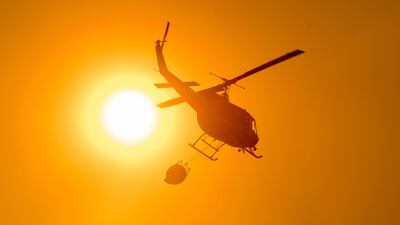"Please slow down, you are crossing the speed limit. Please slow down, you are crossing the speed limit."
The robotic female voice issuing from the dashboard of Abu Dhabi's taxis is, as a friend said recently, one of the ways you know you're home.
Things make noise in Abu Dhabi; they ping and whirr and buzz. My microwave beeps, the dishwasher pings: the tumble dryer, the washing machine, the refrigerator, the coffee pot. Everything wants to communicate with me, whether I want it to or not.
I've become so used to the speed warnings, in fact, that I was surprised this summer when my New York rental car let me zip past the posted speed limits without chastising me. It's been a summer of extreme weather in the United States, wet where it's supposed to be dry, cold where it's supposed to be hot and hurricane season isn't even underway. Who knows what storms are brewing on the horizon?
The extreme weather seems almost a metaphor at this point for what's happening in the US, as if some omniscient script writer has decided to highlight the flaring political tensions with a lack of subtlety that is almost operatic. Not only have there been hailstorms, mudslides and drought, swarms of 17-year locusts have emerged four years ahead of schedule. Scientists in the US track the various "broods" of locusts that typically spend 13 to 17 years maturing underground, and this year noted that Brood X has come out four years early.
Far be it for me to link these plagues of locusts with the 2016 presidential election. I will point out only that scientists link the locusts to the warming temperatures of the Earth, which for a bug-phobe like me is a terrifying thought: more locusts, hatching ever earlier and faster? Horrifying. When my brother and I were young, he used to catch those red-eyed monsters in jars, and then chase me around threatening to release them at me. Ah, the pastoral joys of youth.
If only my brother, as a child, had a version of the Abu Dhabi speed limit voice, warning him that he was crossing the sibling limit and to please put away the bugs because he was causing his sister serious mental anguish.
More from Deborah Lindsay Williams
What happens if we lose our anchors to the past?
Politics matters, but sometimes not as much as good pizza
Jet lag is a modern-day, self-inflicted disease
Why young people must be taught to think broadly
I suppose the process of growing up is, precisely, developing that internal speed-limit voice. Freud called that voice the super-ego, which is the voice of reason, patience and forebearance. It's the voice that tells you not to have the second double-fudge sundae. It's the voice of deferral, or, as a psychology professor of mine once jokingly described it, the "killjoy" voice. Yes, it's super fun to drive down the Corniche at more than 100kph, but it's also really dangerous, so the voice (both internal and external) tells you to slow down.
Even the loud off-season buzzing of the locusts couldn't drown out the sound of outrage at the US president's whispery condemnation of the white supremacist rallies in Charlottesville, Virginia, last week, however. Regardless of what they think about the White House policies in general, journalists, late-night comedians, and politicians all pointed out that in these remarks, the president had a fairly clear remit: tell the country (and the world) that Nazis are bad guys, as are men who drive cars into crowds with the intention of killing people. It's a line so clear that even the speed-limit voice could have detected it, and yet he found ways to equivocate, blaming violence "on both sides."
Tempers and temperatures in the US are boiling over. It's 95 per cent humidity here right now, stickier than a midsummer's day in Abu Dhabi. The locusts have begun to molt, their brown shells littering the ground, and when I inadvertently step on a crunchy shell, the sound makes me shudder. Their swarms are a small illustration of an off-kilter country, and I'm not sure how or if balance can be restored. Judging from their body language at a recent press conference, some of the White House staff seems to share my doubts.
I’m going to be back in the land of the speed-limit voice in a few days, and I have to say that I am looking forward to her cautionary welcome.
Deborah Lindsay Williams is a professor of literature at NYU Abu Dhabi

